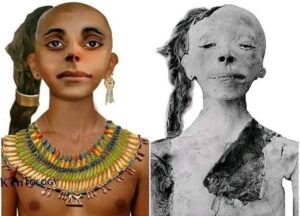The reconstruction of the face of a mummy believed to be that of a young prince from the family of King Akhenaten, father of Tutankhamun, represents a captivating journey into the realms of Egyptology and forensic science.

Through meticulous examination of the mummy’s remains, coupled with advancements in technology and expertise in facial reconstruction, researchers have endeavored to breathe life into the ancient past. By carefully analyzing the skeletal structure, cranial features, and other anatomical markers, forensic specialists have painstakingly pieced together the facial characteristics of the young prince.
Drawing upon historical records, including depictions in ancient artworks and inscriptions, as well as comparative studies with other members of the royal family, researchers have sought to ensure accuracy and authenticity in the reconstruction process.
The result is a striking portrayal of the young prince, offering a glimpse into the visage of a member of one of ancient Egypt’s most illustrious dynasties. This reconstruction not only sheds light on the physical appearance of individuals from antiquity but also contributes to our understanding of their lineage, culture, and society.
As we follow the history of Egyptology, each new discovery and technological advancement brings us closer to unraveling the mysteries of ancient Egypt and connecting with its remarkable legacy. Through the art of facial reconstruction, we bridge the gap between past and present, allowing these ancient individuals to once again take their place in the annals of history.